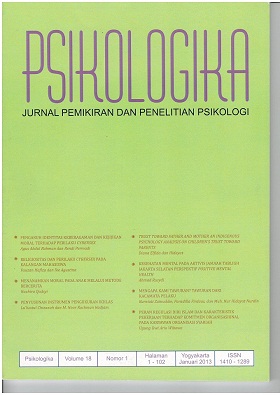Main Article Content
Abstract
Internet make human life easier. Internet enables human to communicate and share information virtually. Meanwhile, internet is sometime misused, such as for gaining sexual pleasure or cybersex. In this study, researchers examined the effect of religious identity and moral disgust on cybersex behavior. Researchers assumes that the identification of religious values and sensitivity to violations of these values can dencrease cybersex behavior. Cybersex behavior consisting of interactive and noninteractive aspect was measured by a cybersex behavior scale (cronbach'alpha = .89); Religious Identity consisting of internalization, religious affiliation, and symbolization is measured by religious identity scale (cronbach'alpha = .93), and moral disgust was measured by a moral disgust scale (cronbach'alpha = .91). Data were obtained from 166 students of Psychology of University X. The results of hypothesis testing using multiple regression analysis showed that religious identity and Moral disgust, both together (R = .483) or individually (â1 = - .325, t = -4256, p <.001; â2 = - .242, t = -3174, p = .002) showed a negative influence on cybersex behavior. In addition, religious identity and moral disgust showed a significant correlation (r = .440, p <.001).
Keywords : cybersex behavior, religious identity, moral disgust
Article Details
Authors who publish with this journal agree to the following terms:
- Authors retain copyright and grant the journal right of first publication with the work simultaneously licensed under a Creative Commons Attribution-ShareAlike 4.0 International License that allows others to share the work with an acknowledgment of the work's authorship and initial publication in this journal.
- Authors are able to enter into separate, additional contractual arrangements for the non-exclusive distribution of the journal's published version of the work (e.g., post it to an institutional repository or publish it in a book), with an acknowledgment of its initial publication in this journal.
- Authors are permitted and encouraged to post their work online (e.g., in institutional repositories or on their website) prior to and during the submission process, as it can lead to productive exchanges, as well as earlier and greater citation of published work (See The Effect of Open Access).




